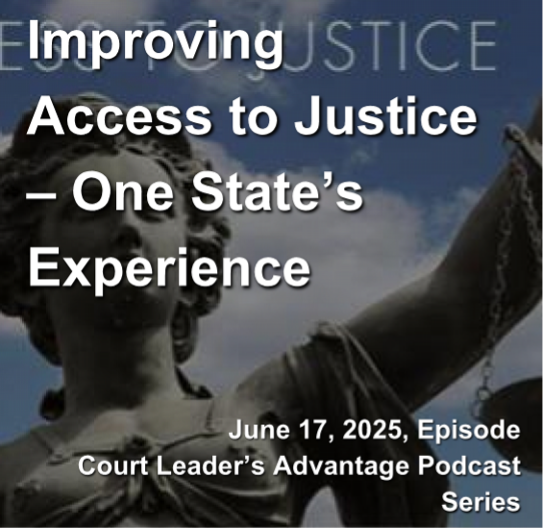January 16th, Court Leader’s Advantage Podcast Episode
Artificial Intelligence. The media is filled with discussions of its potential to dramatically change our lives. It will increase productivity; it will relieve us from having to make mundane decisions; it will reveal heretofore unseen connections.
Conversely, it may eliminate jobs, take away our ability to make complex decisions, fill the airwaves with misinformation, and even threaten our way of life. In addition, many think that artificial intelligence (AI) is just too obscure. It is, frankly, not that important to normal people and everyday life. Some of the questions we will explore include:
• Are there real day-to-day applications of AI affecting courts now?
• Is AI applicable just for large metropolitan courts or is it also a tool for suburban and rural courts?
• Are there aspects of AI that courts need to safeguard against now?
Here to discuss these questions are:
- Kevin Bowling: retired court administrator for the Circuit Court in Ottawa County, Michigan
- Roger Rand: Information Technology Manager for the Multnomah County Circuit Court, in Portland, Oregon. Roger is also on the NACM Board of Directors
- Casey Kennedy: Director of Information Technology, for the State Office of Court Administration, in Austin, Texas
- Alan Carlson: retired Court Administrator for the Superior Court in Orange County, California
- Stacey Marz: Administrative Director for the Alaska State Court System in Anchorage, Alaska
Click here to listen to the podcast. Audio is 45 minutes 29 seconds and the video is 48 minutes 22 seconds.
Leave a question or comment about the episode at clapodcast@nacmnet.org.
This episode discusses #artificial intelligence, #computers, #access to justice, #courts, and #court administration. Viewers interested in artificial intelligence and courts will want to watch or listen to this episode.
Show Notes
Additional Resources
AI and Access to Justice Final White Paper
AI and Courts Working Group Paper Outline
AI and Legal Ethics Final White Paper
AI and Practice of Law Final White Paper
Embracing AI in the Legal Sphere
Unveiling the Future of Legal Through
The NYT vs Open AI Is Not Just a Legal Battle
Watch Pro Interpreters vs. AI Challenge: Who Translates Faster and Better? | Currents | WIRED
Webinar: Impact of AI in the Courts on Vimeo
Webinar: AI and the Impact on the Practice of Law on Vimeo
Webinar: AI 101 - The Promises and Perils of AI in the Courts on Vimeo
 Alan Carlson
Alan Carlson
Alan Carlson has worked as a court executive and management consultant in state trial courts for over 45 years. He served as Court Executive Officer (court administrator, clerk of court, and jury commissioner) of the Orange (CA) Superior Court, Court Executive Officer of the San Francisco Superior Court, Executive Officer of the Monterey County Superior Court, and Assistant Executive Officer of the Alameda County Superior Court. He has also served as President of Justice Management Institute (court management consultants), Director of Court Services at the California Administrative Office of the Courts, and as an NCSC Staff Attorney. He has a J.D. from U.C. College of the Law, San Francisco, and a B.S. in Industrial Engineering and Operations Research from U.C. Berkeley.
 Casey Kennedy
Casey Kennedy
Casey Kennedy joined OCA as the Director of Information Services in 2010. His team provides direct IT support for the Texas Supreme Court, Court of Criminal Appeals, the 14 intermediate appellate courts and several judicial branch state agencies. Additionally, Casey manages the largest volume eFiling system in the known universe. Casey is also the lead OCA staff for the Judicial Committee on Information Technology or JCIT. The committee is appointed by the Supreme Court and makes recommendations and sets standards for court technology in Texas. Casey is currently the chair of the Court Information Technology Officer Consortium, a national organization of Court IT professionals. He holds a BA in Computer Science from The University of Texas at Austin.
 Kevin J. Bowling
Kevin J. Bowling
Kevin J. Bowling, JD, MSJA, CCE is recently retired as the Trial Court Administrator and Attorney Referee for the 20th Judicial Circuit Court and the Ottawa County Probate Court in Ottawa County, Michigan. He is a Past President of the National Association for Court Management, Co-Chair of the COSCA/NACM Joint Technology Committee, and Chair of the DOJ Global Advisory Committee. His work in the judicial system spans 40 years with time spent as a court manager, attorney, judicial educator and court consultant, including service in western Africa as Deputy Chief of Party for the Nigeria Justice Sector Assistance Project.
Kevin served for 20 years in a variety of positions with the Michigan Supreme Court, including State Judicial Educator and Regional Court Administrator. Kevin received his B.A. in Political Science/Public Administration from Providence College, Providence, Rhode Island; a M.S. in Judicial Administration from the University of Denver College of Law; a J.D. from Thomas M. Cooley Law School in Lansing, Michigan, and is a Fellow of the Institute for Court Management.
Kevin is a member of the State Bar of Michigan, Ottawa County Bar Association, National Association for Court Management, National Association of State Judicial Educators, and Michigan Juvenile Justice Vision 20/20. He has served on the Board of Directors of the National Association for Court Management, the National Association of State Judicial Educators, and is a Faculty member of the National Judicial College. Kevin is a trained mediator and serves on the Board of Directors for Mediation Services in Holland, Michigan. In addition, he is a member and former Vice President of the Michigan Association of Circuit Court Administrators.
 Roger Rand
Roger Rand
Roger Rand is the IT Manager for the Multnomah Circuit Court, in Portland, Oregon. The Multnomah Circuit Court is the largest of the 36 judicial districts that make up the Oregon Judicial Department (OJD). The OJD is a statewide general jurisdiction court system. The Multnomah Circuit Court spans 5 court locations and has 56 Judicial officers and over 330 staff that manage all types of case types including municipal parking and traffic cases, civil, criminal, family law, juvenile, and probate.
Roger has a BA in English from the University of Notre Dame. Roger interned with the Oregon Attorney General’s office and started his career in the Multnomah Circuit Court in 1993. He moved into court technology around the year 2000. He worked as an IT Trainer, Help Desk Lead, Help Desk Supervisor and became IT Manager in 2015. Roger’s responsibilities include managing departments that provide technical hardware and software support, software development, training, data analysis, and project management. He is a member of a court management team that oversees all local court operations. He works closely with the OJD’s Enterprise Technology office that oversees the statewide Tyler Odyssey system, the information technology data network and security systems. Roger is also the chair of the Multnomah Circuit Court Diversity Equity and Inclusion committee.
Roger joined the NACM board in July 2021. He is the Vice Chair of the NACM Communication Committee and leads a team of technicians managing NACM’s webpage content. His is also the Vice Chair of the NACM Diversity, Equity, and Inclusion Committee.
 Stacey Marz
Stacey Marz
Stacey Marz has been the Administrative Director of the Alaska Court System since 2019. Prior to that, she was Director of Self- Help Services for the Alaska Court System. In this position, she oversaw the Family Law Self-Help Center, a statewide program for self-represented litigants in family law cases that works with customers by phone. She also managed the court's self-help websites and self-help forms development for appeals to the Supreme Court, family law, probate estates & guardianship and conservatorship. She co-founded the innovative Early Resolution Program that mass calendars newly filed contested divorce and custody cases and uses pro bono unbundled attorneys and court mediators to help self-represented litigants resolve their disputes usually in one court hearing. Stacey is a member of several Supreme Court committees, representing the perspective of self-represented litigants and improving access to justice. As a member of the Administrative Director’s senior staff, Stacey trains judicial officers and court staff statewide on how to work effectively with self-represented litigants and individuals needing interpreters. She has presented nationally on self-help services and access to justice initiatives. She is also a member of the Alaska faculty for Seattle University School of Law. Stacey is a fellow of the National Center for State Courts Institute for Court Management and is a certified court manager and certified court executive. She clerked for the Alaska Supreme Court from 1993-1995 after graduating from the University of Oregon School of Law.




